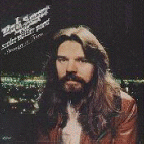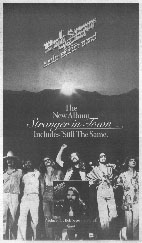![]()
  |

Stranger In Town
Bob Seger
Capitol 11698
Released: May 1978
Chart Peak: #4
Weeks Charted: 110
Certified Platinum: 5/30/78
 Bob Seger's no longer a stranger in town. Since Night Moves, he's been expected eagerly, and he's almost six months overdue. Live Bullet put Seger on the national map of riding the secondary roads, and Night Moves, coming hard on its heels, proved that the Midwest's great journeyman rock & roller could cut it in studios and on singles charts as well as onstage. Seger's success was an affirmation of rock & roll's essential durability, because his homegrown, audience-honed music was derivative in the best sense. He was, after all, practically a rock & roll archetype: an authentic hardworking, hard-traveling man, a gambler whose best-selling album was the one on which he reviewed his life, adding up the score and deciding whether or not he was too old to play anymore.
Bob Seger's no longer a stranger in town. Since Night Moves, he's been expected eagerly, and he's almost six months overdue. Live Bullet put Seger on the national map of riding the secondary roads, and Night Moves, coming hard on its heels, proved that the Midwest's great journeyman rock & roller could cut it in studios and on singles charts as well as onstage. Seger's success was an affirmation of rock & roll's essential durability, because his homegrown, audience-honed music was derivative in the best sense. He was, after all, practically a rock & roll archetype: an authentic hardworking, hard-traveling man, a gambler whose best-selling album was the one on which he reviewed his life, adding up the score and deciding whether or not he was too old to play anymore.
On Stranger in Town, Seger chooses the image of the perpetual traveler, exiled by the winds of his own going. Like the beautiful loser, it's a role he knows well. He's even played it before in some of his best songs ("Turn the Page," "Travelin' Man"). Characteristically, he reads the part with more self-doubt than swagger, more regret than romance. Still, Seger's not resting on his legends. "We were players, not arrangers," he boasts (in "Brave Strangers"), but at the same time, Stranger in Town is his most thoughtful and promising attempt at reconciling spontaneity and calculation.
 Click for larger view. |
In spite of such lapses, Stranger in Town is Bob Seger's most consistent record. Without heeling to a concept, most of the songs touch on one form of isolation or another, but Seger's loners aren't exactly heroes. The loser in "Hollywood Nights" finds himself dazzled and betrayed -- and taken for a rube. The gambler of "Still the Same" is a system player who takes no risks. The suitor in "We've Got Tonite" piles on every cliche in the book, then repeats them all, while the departing lover in "The Famous Final Scene" mocks himself with his own theatricality. Night Moves threatened defeat and countered with endurance, Stranger in Town, a more polished and modest LP, is likelier to scuffle and retreat. Without heroes, without tragedy, it avoids the melodrama that sometimes made Night Moves pretentious, but neither does it achieve -- or only rarely -- the earlier album's awkward, naked individualism.
Last time out, Seger risked failure by acknowledging it. On Stranger in Town, he risks anonymity in much the same manner, then hides behind his music. Bob Seger keeps hanging by a thread, but that's part of his charm. He records rather than romanticizes experience, and so leaves himself at its mercy -- and at ours.
- Ariel Swartley, Rolling Stone, 7-27-78.
Bonus Reviews!
Possibly everyone but Kitty Wells and I already noticed this, and maybe even she did (I've been exiled to the suburbs, that's my excuse, but now I've been spring, praise the Lord), but in case it's news to somebody, Pretty Good Rock is making a comeback. Not what you'd exactly call progressive rock, if you're a true child of the Sixties. But none of these extreme rock, either, something between punk and disco, something that kicks the beat along with a new vitality and... isn't bizarre. But listen. There's some stuff with some drive to it, some new energy. It's getting so you can drive your car and tune in an FM rock station and actually catch yourself listening.
Just now I've been listening to this new album by Bob Seger and his Silver Bullet Band, Stranger in Town, on Capitol, and it seems a veritabobble celebration, as the late Pogo would have said, of the return of Pretty Good Rock. Seger in the early Seventies was a stranger in every town except Detroit. In those days it seemed that everybody in Detroit, a few pop writers, and approximately fourteen other people knew about him. Now he's having it both ways: he's still a new face most places around the country, having been noticed only in the past couple of years, and so he can capitalize on this culture's conditioning to want (or think it wants) newness, and yet he's a seasoned veteran who's had a lot of time to find out what works for him and what doesn't, what he likes and doesn't like, and what he can play with gusto and what he can't.
I'm pretty much too lazy to analyze the whole return of Pretty Good Rock to see if that's what propels it -- veteran who still manage to seem new -- but Seger's album persuades me that they could it if there are enough of them left in stock. Seger's songs here have actual tunes to them -- maybe not original tunes, maybe derivative as all get out, but they're too busy going somewhere to apologize. Rock doesn't need only killer tunes, but it needs some. Seger's lyrics, and those of the other three writers he invokes, contain no great revelations and certainly no poetry (pop music still is in a nonverbal state, by and large), but they're not an embarrassment if you want to listen to them. "Feel Like a Number" and "Till It Shines" are worth going out of your way to hear, tool.
But what really puts this one across is the way Seger and the Silver Bullets handle the beat. It sounds like a simple thing, to say a musician should stay on the beat. All musicians play on the beat, you say, or else they aren't musicians. But there are degrees of being on the beat, as I found out by playing a little rhythm guitar; there are times when an individual picker finds the beat second nature, the most natural thing in the world, and there are times when he has to fight to stay on it. You take a whole band of such individuals and put them on a schedule, a recording regimen, and it's a wonder recordings sound as spontaneous as they do. So Seger may have profited here by sheer luck, a coincidental coming-together of several people's bio-rhythms, or he may have nudged the whole process along with some of the know-how he's picked up over the years. Or maybe a little of both.
Whatever, it's a gas: a rock album that seems peculiar to its time, even though it may seem, from moment to moment, awfully clearheaded and ungimmicky for its time. I see it as a good influence, a call to ignore more and more trendy junk and get on with the unbusiness of rocking people's socks off.
- Noel Coppage, Stereo Review, 8/78.
It's not quite as strong as Night Moves, but Stranger in Town continues Seger's streak of great songwriting and performance. Highlights include the relentless rockers "Hollywood Nights" (number 12) and "Feel like a Number." Seger's facility with the ballads "Still the Same (number 4) and "We've Got Tonight" (number 13) produced substantial hits. * * * *
- Rick Clark, The All-Music Guide to Rock, 1995.
Stranger in Town and 1980's Against the Wind are of a piece, cementing the mass success grasped by Night Moves without really advancing the craft. * * * *
- Gary Graff, Musichound Rock: The Essential Album Guide, 1996.
Gritty, but big-hearted, Bob Seger was the sound of blue-collar America, detailing the lives of the common man through diner, roadhouse and bar. With its raunchy, rhythmic rock, combined with a winning touch of setimentality, Stranger In Town consolidated his growth from a huge local act in his native Detroit to a nationwide big draw. The album peaked at Number Four, and became his first Top 40 album in the UK, reaching 31. The album spent 110 weeks in the charts.
Seger's R&B-based rock takes on a more commercial sheen than on his previous album. "Still The Same" became a top five single in the US, as did the album's opener, "Hollywood Nights." Also, somewhat hidden away, was "We've Got Tonight," one of Seger's strongest songs and the one that remains his most covered. Stranger In Town saw David Teegarden taking over from Charlie Allen Martin as drummer. Keyboardist Robyn Robbins quit the Silver Bullet Band after the album's release.
Together with 1976's Night Moves, Seger had now set the path for the next decade, with several Top 10 hits including his only Number One, "Shakedown," from 1987's Beverly Hills Cop II soundtrack. "Old Time Rock And Roll" also re-entered the charts in 1983, after it featured in the movie Risky Business, starring Tom Cruise.
As of 2004, Stranger In Town was the #40 best-selling album of the 70s.
- Hamish Champ, The 100 Best-Selling Albums of the 70s, 2004.
![]() Reader's Comments
Reader's Comments
No comments so far, be the first to comment.